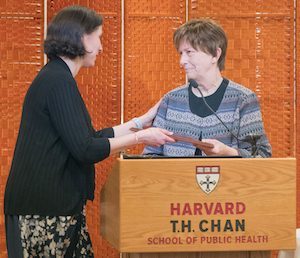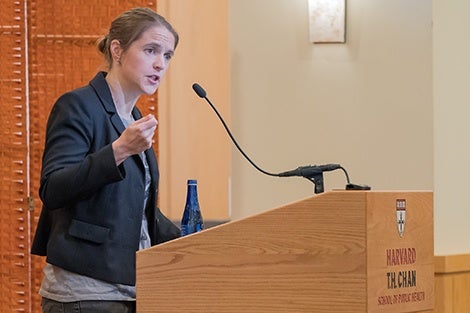April 30, 2019 – To curb diseases like malaria, it’s crucial to know which people are infected so they can be treated, and to know their location so the spread of disease can be slowed. Harvard T.H. Chan School of Public Health’s Caroline Buckee says that new technologies such as cell phones and portable low-cost molecular tools are improving experts’ ability to track and contain disease, particularly in remote, underdeveloped settings among vulnerable populations.
Buckee, associate professor of epidemiology and associate director of the Center for Communicable Disease Dynamics, received the 2019 Alice Hamilton Award at a ceremony in Kresge cafeteria on April 24, 2019, for her work using big data and mathematical models to study the spread of infectious diseases.
Watch a video of the Alice Hamilton Award Lecture and Ceremony
Albert Hofman, chair of the Department of Epidemiology, spoke about Buckee’s achievements, which included co-authoring a widely shared paper that estimated Hurricane Maria-related deaths in Puerto Rico. Jane Kim, professor of health decision science and co-chair of the Committee on the Advancement of Women Faculty (CAWF), presented Buckee with the award, which recognizes the impact in public health and the future promise of a woman faculty member. The award honors the memory of Alice Hamilton, a pioneer in the fields of toxicology and occupational health and the first woman appointed to the faculty at Harvard in 1919.
Buckee noted that Hamilton must have faced tough challenges in the male-dominated Harvard of a hundred years ago. “We need to be grateful to those who came before us,” she said, adding that there is still much work to do to support women in science. “We still don’t have enough women faculty, we still don’t make sure that they don’t leave, we still don’t have enough tenured women faculty,” she said.
Describing her research, Buckee talked about how previous mathematical models used to predict the movement of populations within and between countries were insufficient in helping pinpoint disease trouble spots. Buckee and colleagues have developed new models that incorporate cell phone data to help accurately track people’s movements and predict disease transmission. Having such data is crucial in helping officials figure out where to deploy interventions to stop the spread of disease, she said.
Buckee added that new portable molecular tools—including small devices that can sequence genomes—will also be important to help identify disease among populations in remote areas.
Two other awards were presented at the ceremony.

Michele Biscoe, assistant director of senior searches and reviews in the Office of Faculty Affairs, received the CAWF Service Award for exceptional service and effort toward the advancement of women faculty at Harvard Chan. CAWF co-chair Josiemer Mattei, assistant professor of nutrition, thanked Biscoe for handling administrative and operational tasks for CAWF “with heart, dedication, and excellence.”

Marianne Wessling-Resnick, professor of nutritional biochemistry, received the CAWF Mentoring Award. Research scientist Khristy Thompson called Wessling-Resnick an outstanding mentor. “Her advice is much like her writing style—clear, straightforward, and strikingly insightful,” Thompson said. The key to Wessling-Resnick’s success as a mentor, she added, is “her honesty and her goal to educate us about what it’s like to be a scientist in this world.”
The event also featured introductory remarks from Dean Michelle Williams and a presentation on Alice Hamilton from Joseph Brain, Cecil K. and Philip Drinker Professor of Environmental Physiology and co-author of a soon-to-be-published book about Hamilton. Brain spoke of Hamilton’s academic achievements as well as her role as a social reformer and pacifist.
photos: Tammy Brown
